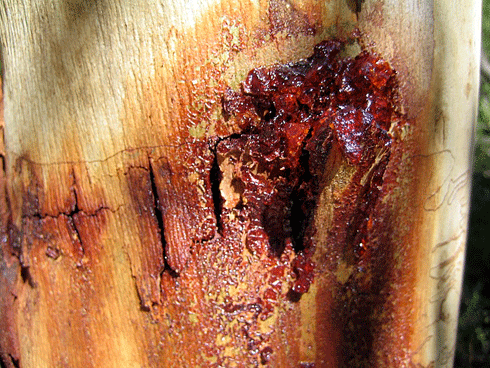
|
Published: 17 December 2012
Antibacterial treatments from eucalyptus gum?
The resin from ‘wounds’ on damaged eucalyptus tree trunks should be investigated for their medicinal use due to their high antibacterial activity, say scientists from the University of Western Australia.

|
|
A eucalyptus kino. Credit:
dirtymouse/flickr under Creative Commons CC BY-NC 2.0 licence
|
According to their study, published in the Journal of Ethnopharmacology, the use of kinos (tannin-rich, mostly red-coloured wood exudates) in Aboriginal communities suggests kinos may potentially be a source of effective new therapeutic agents.
UWA Associate Professor Connie Locher says it is surprising to see how little recent research has been carried out into the chemistry of kinos.
‘There are no direct medicinal uses in mainstream medicine, but they are still used as a traditional medicine in Australia and also in other parts of the world (using kinos also derived from other plants),’ Dr Locher says.
‘They are nonetheless interesting from a science perspective as it gives backing to a traditional medicine and of course there is always hope to find new ways of treating bacterial infections – even if this means one has to revisit some old-fashioned medicines.
‘[The study] confirms that kinos do have antibacterial and also astringent activity and therefore confirm a lot of their traditional medicinal uses.’
The study, which looked at 19 different eucalyptus kinos collected from Kings Park, found kinos from Corymbia maculata and Eucalyptus ficifolia demonstrated a strong antibacterial activity towards Gram-positive bacteria.
‘Their antibacterial effect is assessed in a hole plate diffusion assay, where test solutions are placed in little wells in agar plates,’ Dr Locher says.
‘Explained in lay terms, the substances diffuse into the agar and inhibit the growth of the bacteria in that particular area.
‘The larger the zone of inhibition, the stronger the antibacterial effect.’
Dr Locher adds that most of the kinos were also active against Gram-positive bacterial albeit to a different degree.
‘Although the kinos we tested recently were not active against Gram-negative bacteria we have found in another study [not yet published] that some of the subfractions are active, hence they also seem to contain constituents which in higher concentrations have a broad spectrum antibacterial activity.’
According to the study the use of kinos as traditional medicines is widespread within the Indigenous community.
Aboriginal people have been known to prepare aqueous extracts or crushed pure eucalyptus kinos for direct application on burns, the alleviation of muscle aches, cramps, eye infections and toothache as well as the treatment of wounds, scabies, ringworm, sore lips and venereal sores.
Kinos were also used internally to treat diarrhoea, dysentery, infections, cough, cold and influenza.
Source: ScienceNetwork Western Australia



